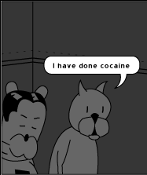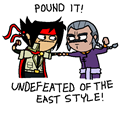|
Otherkinsey Scale posted:Wanted to dip in to give a shoutout to Moriatti for whipping up this cute-rear end sprite of my character for his game. He showed me one for my dinosaur robot which was real good but I asked to do some retouches. Looking forward to see it!
|
|
|
|

|
| # ? Jun 11, 2024 08:38 |
|
Serf posted:the sooner this playstyle dies out the better imo It's really a game mechanical problem. If people want to feel like their characters are acting judiciously, but don't want to spend the time playing out every single room sweep, they should just be able to say "we proceed through the dungeon taking maximum care to search for traps and dangers" and just make a single Dungeoneering or Investigation or whatever check with the appropriate stakes and modifiers and resolve it then and there.
|
|
|
|
Honestly, if people want to play Hidden Object Game: The RPG I don't really mind, but everyone needs to be onboard with that ahead of time.
|
|
|
|
Tendales posted:Honestly, if people want to play Hidden Object Game: The RPG I don't really mind, but everyone needs to be onboard with that ahead of time. it's exactly this In the same way there's nothing wrong with playing murderhobo "It's Always Sunny in Neverwinter," or fully non-combat social game with PC backstabbing as long as everyone knows what they're getting into and enjoys it, rather than dragging everyone into that game, or punishing a player who doesn't understand what you're aiming for.
|
|
|
|
Ferrinus posted:What do NPCs have to do with it? Goku can't turn super saiyan without Krillin dying. If advancement on failure is good enough for Goku, its good enough for everyone else.
|
|
|
|
Vegeta, Goten and Trunks became Super Saiyan without that need.
|
|
|
|
Plutonis posted:Vegeta, Goten and Trunks became Super Saiyan without that need. Krillin already died, so thatís what allowed them to do it. His failures are what advances power in that universe.
|
|
|
|
Every single time, Goku and friends need to get the poo poo beat out of them before they can hit their training, come back, and win. It's like cosmic dbz law.
|
|
|
|
Anyone planning on running a game here that isn't PBP format, cause I'm really getting into the mood of wanting to play something
|
|
|
|
Plutonis posted:Vegeta, Goten and Trunks became Super Saiyan without that need. Future Trunks had Gohan die to go super saiyan, Vegeta had his self worth die as he kept failing and failing to keep up with Goku, Goten/Trunks went super saiyan when Toriyama's desire to keep writing died. dwarf74 posted:Every single time, Goku and friends need to get the poo poo beat out of them before they can hit their training, come back, and win. It's like cosmic dbz law. This was such a rule that they straight up said saiyans get way stronger every time they get their rear end kicked.
|
|
|
|
kingcom posted:This was such a rule that they straight up said saiyans get way stronger every time they get their rear end kicked. Vegeta explicitly games this, bringing us full circle.
|
|
|
|
Serf posted:this is what we call "bad design" The part he's not saying is that you also earned said Drama Dice in play by doing Swashbuckling Hero poo poo. They weren't just a static resource to spend. Liquid Communism fucked around with this message at 02:03 on Feb 15, 2019 |
|
|
|
Halloween Jack posted:I, for one, would not in fact go about this with a "If you do stupid poo poo for no reason and deliberately fail there's some guaranteed points in it for you later" approach. Combining XP and Action Points into one mechanic is a bad 90s artifact for a reason. Hah they're older than that. Hearken back to the Ghostbusters RPG, where Brownie Points were your hit points, XP, reroll purchase karma, and the metric that determined how much you got paid in a mission, all at once.
|
|
|
|
fool_of_sound posted:Vegeta explicitly games this, bringing us full circle. Yeah in a pretty clever way and then the GM kills him for it.
|
|
|
|
DalaranJ posted:Hmm, challenge accepted. We would definitely be able to have fun with that premise. Just keep throwing more and more things at the part and really complicate the day. The rock slide alerted a pack of kobalds. You managed to fight off the first wave. From the distance you hear the telltale gibbering of more along with what sounds like...bears? Yes! This particular band of kobalds has trained bears. They're wearing makeshift armor that's a size too small. It's quite adorable. And suddenly the sky begins to darken and you hear a rumbling of thunder in the distance. I don't think I would do that in 3.5 though because combat is miserable and unfun imo. But a system with fail at a cost? Just keep things rolling to increasingly comical levels
|
|
|
|
Someone once explained to me - because I'm an idiot and did not understand it before - exactly what the fundamental purpose of dice in a story-telling game serve. Forgive me if I am lecturing the choir, but I do have a point I want to get to. Dice (or whatever randomizer you use, cards, spinners, etc.) allow players to take actual risks, and without them, they cannot truly do so. Imagine a roleplaying session in which there is a GM and players, but no rules, no books, no dice, they're just storytelling with the traditional GM and Player roles. Whenever a player says their character does something where they might or might not succeed, the GM decides what happens. When the fair-minded GM thinks the odds are pretty much 50/50, she can more or less just close her eyes and try to "randomly" decide which path things go down. She will fail at this in short order, however, because psychologically it's impossible to not remember whether the players have been "succeeding a lot lately" or "failing a lot lately" and adjusting the decision one way or the other to compensate. Conversely, the unfair-minded GM can intentionally push things such that character risk/outcomes skew in a specific direction - could be more successful, or more unsuccessful, or could be pushing towards a particular story conclusion that she prefers. In neither case is the GM capable of actually being genuinely arbitrary, however. The factor by which even a fair-minded GM is likely to be unintentionally unfair is directly related to the odds of success' deviation from 50/50 (or 33/33/33 for the-option outcomes, etc.). So, while it's difficult enough to have players roughly succeed half the time at moderate, coinflip-like attempts at doing things, it's vastly more difficult to have them succeed 5% of the time at extremely risky attempts, or 95% of the time at almost-totally-safe attempts, over a series of hundreds of trials. Even with meticulous record-keeping (which I think starts to become "a game with rules" rather than total freeform anyway), it's likely that the fair-minded person will wind up doling out success exactly once every 20 times, with 19 failures in between, rather than the reality of clustered successes separated by sometimes zero or a few failures and sometimes a string of far more than 20. Plus, "this should succeed exactly 5% of the time" is itself an extremely arbitrary judgement in a system without rules telling you that; in reality, players and the GM would just have a sense that "this is really unlikely to succeed" or "this is really likely to succeed" and in practice, players would just always succeed or always fail at such attempts. In this imaginary freeform game, then, the players are likely to quickly suss out how much risk they can attempt before the GM starts always saying they fail. If it seems like big risks succeed more often, they'll take them more often. If it seems like they never work out, they'll always avoid them. Meanwhile, they may or may not resent the GM's failure to be "fair", since they know perfectly well that when the GM announces that Sarah's bold attempt to swing across the chasm on the greased rope has failed and she has fallen into the lava and her fiery death, that she could just as well have let it pass this time, when she knew it was really important! This all seems really obvious probably, and also not germane. But I'm reminded of it when we talk about what a game system incentivizes players to do w/r/t taking risks, because the basic function of the dice roll is to remove from the players and especially the GM a responsibility to futilely attempt to be "fair" in a way that lets them occasionally succeed at highly risky attempts, and replace that with a system that is actually consistent and therefore accountable and predictable. With a system that uses dice, if Sarah falls in the lava, and the player knew she needed a natural 20 to make it but tried it anyway, they may be upset, but at least the system was fair. Predictability isn't "we know we'll succeed," it's "we know what the odds are, and what is probably going to happen if we fail." So: if players are acting "too risk-averse" in a game, I don't think it comes down to incentives/disincentives for risk; rather, the players have determined* that the game itself is punishing failure in a way they are not willing to accept. Providing some kind of incentive to take more risks under those conditions sounds to me like trying to engineer a new mechanic to overcome another mechanic's failure. Finding a perfect balance through mechanics that exactly incentivize risk-taking enough that the players will want to do it exactly the right amount, but not too much! But not too little! Seems like a fool's errand to me. Instead, remove the bad outcome the players are always trying to avoid. If they're willing to ruin the pacing of the story just to not have X happen, then remove X from the possible outcomes. Nobody should dread a dice roll. Dice rolls are supposed to be cases of a game system being more fair than if the players/GM just arbitrarily decided what would happen. Everyone should feel happy about that moment; its the game system doing its job. I'm not saying games should never have a tense moment. But that tension, like a roller coaster, should be the fun kind of thrilling. A game system's presentation of methods for compounding or mitigating risks should be designed to serve the full variety of options and outcomes that the players and GM want to enable; not to try to tempt players into doing something that could result in an outcome they don't want to experience at the table. Systems that add in risk mitigation options mechanically aren't automatically wrong, either: if they give players interesting choices and more control, which they want, then that's cool too. See the dice pools/doom tokens/complications stuff people have already mentioned. But I don't see any of those systems as being intended to coerce players into taking risks they otherwise don't want to take. *Their determination could of course just be wrong, if they've misunderstood what the actual risks are, or what their actual odds are; this is a communication problem easily solved with a discussion.
|
|
|
Leperflesh posted:So: if players are acting "too risk-averse" in a game, I don't think it comes down to incentives/disincentives for risk; rather, the players have determined* that the game itself is punishing failure in a way they are not willing to accept. Providing some kind of incentive to take more risks under those conditions sounds to me like trying to engineer a new mechanic to overcome another mechanic's failure. Finding a perfect balance through mechanics that exactly incentivize risk-taking enough that the players will want to do it exactly the right amount, but not too much! But not too little! Seems like a fool's errand to me. The incentives in a game system direct player attention. If you incentiveize failing rolls, you won't necessarily get players to risk their character's well-being, but you will absolutely get them to spend mental energy considering options to fail rolls or ordering the party from least to most skilled when attempting skill rolls. I think there are better things you can get them to focus on.
|
|
|
|
|
Mystic Mongol posted:The incentives in a game system direct player attention. If you incentiveize failing rolls, you won't necessarily get players to risk their character's well-being, but you will absolutely get them to spend mental energy considering options to fail rolls or ordering the party from least to most skilled when attempting skill rolls. I agree completely. My point here is that I think it's a mistake of mechanics design to attempt to coerce players into taking risks they otherwise don't want to take, by offering an XP reward for doing so. If there is some other design goal being served by offering XP for failures, that's possibly fine, though.
|
|
|
|
theironjef posted:Hah they're older than that. Hearken back to the Ghostbusters RPG, where Brownie Points were your hit points, XP, reroll purchase karma, and the metric that determined how much you got paid in a mission, all at once. Man that engine is still pretty solid.
|
|
|
|
So I think it's less 'tempting them to take risks' and more assuring them 'this failure is an expected part of the game and will not ruin everything.' Even if there's no option that will actually ruin the game, convincing players that things both matter in-universe (their characters are really facing serious challenges with meaningful risks and dangers) and are ultimately a roller coaster (no matter what there will be a narratively satisfying game) is a task. I find making sure there's a clear 'this failure still has upsides' also communicates 'this failure is part of a story that will never be ruined by it' even if academically player and GM both know that no failed roll will end the game.
|
|
|
|
I will admit that I kind of skimmed over the topic because the discussion is hard to follow, but in these cases of "very risk-averse players", what actually happens in the game if left as-is? I ask because if you lay out a goal for the players to achieve, say, "grab the McGuffin inside the house", then the players technically can't ever be too scared of wanting to do it that they don't do it, or else you don't have a game. Like, they'd plan on how to do it, and if they're careful, they may well plan a lot and try to cover a lot of contingencies, and the tedium that that might cause is an issue, sure, but at the end of the day they're going to have to execute, and even if they align every "skill check" against the character that's best equipped to handle/pass that check, they're always going to have to face the dice, which means they're always going to have to face uncertainty at one point or another. And hey, if they all line up the specialists against their specialties as part of the plan, then maybe they pass all the checks, and everything goes off without a hitch, which is a good thing in and of itself, because it demonstrates the strength of their planning and the competency of their characters. Or maybe something goes awry. But in the middle of that ... that's the game? I'm not saying that there isn't a problem, but I'm trying to understand what it is. Have people had sessions where the players were so risk-averse that they basically didn't want do the thing that they were supposed to, at all?
|
|
|
|
gradenko_2000 posted:I'm not saying that there isn't a problem, but I'm trying to understand what it is. Have people had sessions where the players were so risk-averse that they basically didn't want do the thing that they were supposed to, at all? I definitely have, and they are not fun to play with at all.
|
|
|
|
gradenko_2000 posted:I will admit that I kind of skimmed over the topic because the discussion is hard to follow, but in these cases of "very risk-averse players", what actually happens in the game if left as-is? It's a combination of tedium - players being very slow to act and always taking the most cautious possible route to their goal - and, frankly, anxiety. I have players who are really fantastic, but at least two of them take failure at tasks in the game like a punch in the gut, by default. They hate feeling like they let down the group or like they caused problems, especially when those problems endanger NPCs or other PCs. They're mostly fine getting their own characters into horrible situations, but anxiety sets in when other characters are hurt or inconvenienced by their actions. Also, some of my players find failure in general frustrating, which is not unusual for people, but they and I can feel the game get more boring when there's no real challenges. Mostly, this is more of the same anxiety about 'did we do enough prep' or 'is it really ok for us to fail when we're trying to do things we're emotionally invested in succeeding at.' This is a really unreasonable burden they're taking on, and everything goes smoother when I can, from the GM chair, reassure them that the failures and complications they acquire are in fact good and intended and don't gently caress anything up. I've found 'you and the entire group get EXP for failing rolls badly' to be a really good way of making it clear that this is expected, this is part of the game, and they can and should sometimes do things they're not the optimal choice for when the narrative makes sense. The same is true of 'you and the entire group get EXP for haring off on side quests from the main plot' - it helps players feel like their diversions and interests are also, indirectly, supporting the main plot. My players are pretty invested in success in this campaign, and also, 3/4 of my players in this game are really team players and will go out of their way to try to take the team to success even if it sidelines them as PCs (the last player hates feeling like she's making her character do things 'for the good of the party' or other meta-level decisions, and so we've been working on the opposite tack of her recognizing when her character might just come along for the sake of her friends/the game). EXP-for-failure is a way of saying 'failure is a natural and not a negative part of play' which is, frankly, a rare thing in non-fail forward TTRPGs. Half my players are strongly averse to the sense of failure, period, and we've been working together on that. EXP-for-failure helped with that, so, I think it has a clear role. (My players are all fantastic for the record, and this sort of thing is totally natural for finding a way to make a game not just engaging but pleasant even while characters go through hell)
|
|
|
|
yall gotta think of some ways to motivate your players oh you want to keep searching this room? the walls begin closing in you don't want to leave the tavern? the walls begin closing in players don't want to take your quest from the duke that you wrote out? tell them they were all secretly poisoned by the duke and the only way they'll get the antidote is by doing his quest dming is easy
|
|
|
gradenko_2000 posted:I will admit that I kind of skimmed over the topic because the discussion is hard to follow, but in these cases of "very risk-averse players", what actually happens in the game if left as-is? The problem you see at the table isnít players afraid of pursuing the adventure, but instead relying on their highest skill for literally everything. If a player needs to break into ten buildings across ten adventures, instead of coming up with a plan specific to the situation, theyíll look at their sheet, see ďaccounting 82%Ē and audit the buildings finances ten times. By quietly bribing he players to fail at their less good skills, the hope is they will notice the ivy crawling up the back wall and roll against their Botany 32% skill to know which vines hold weight the best. In practice Iíve found it mostly encourages a pollution of actions taken with the hope of failure that jams up the flow of the session. Still, maybe with the right nerds it will work.
|
|
|
|
|
gradenko_2000 posted:Have people had sessions where the players were so risk-averse that they basically didn't want do the thing that they were supposed to, at all?
|
|
|
|
Meyers-Briggs Testicle posted:players don't want to take your quest from the duke that you wrote out? tell them they were all secretly poisoned by the duke and the only way they'll get the antidote is by doing his quest I hope you enjoy hour after hour of paranoid anti-secret-poisoning precautions.
|
|
|
|
Meyers-Briggs Testicle posted:yall gotta think of some ways to motivate your players Noticed an error. No need to thank me.
|
|
|
|
hyphz posted:Well, if inconsequential failure generates XP, then the player can argue their PC goes off and spars or whatever until they have max XP. Which is awkward to argue against because itís how people actually do learn in a world where you learn from failure. This is the same, indirectly, if inconsequential actions arenít rolled. I ask this in all seriousness, but do you really think this will fly at most gaming tables? Back around 2006 when 3rd Edition was a thing, a notable WotC forum min-maxer by the name of Frank Trollman argued that 1st level D&D characters could start with massive wealth by playing as Elves and rolling Profession (Farmer) checks for 100 years before they became adults. Now, this is something that wouldn't fly in most games, but to Frank this was a huge flaw that he presumed most gaming groups would exploit, and thus an explicitly worded rewrite of the rules in his homebrew was necessary to prevent edge cases of players acting like dicks. And not just with this hypothetical scenario, but every other case where the rules were unclear and vague. This is the Elf Baby Farmer problem all over again.
|
|
|
|
One of my 2019 goals is supporting minorities and new self-publishers in TG. Iím popping in to share some of the resources Iíve found. More seats at the Table: https://patreon.us15.list-manage.com/subscribe?u=c71a6dc90e8b0c6728a9e2dcb&id=6eadbc8c82 Asians Represent! http://oneshotpodcast.com/category/podcasts/asians-represent/ Sheís a Super Geek http://sasgeek.com/category/podcasts/ Queering Games panel: https://www.gauntlet-rpg.com/the-gauntlet-podcast/queering-games Thereís plenty more out there, too. Sorry about the long links ó Iím phoneposting.
|
|
|
|
Libertad! posted:I ask this in all seriousness, but do you really think this will fly at most gaming tables? It might not fly, but its existance can change the nature of the game. If the players are losing an encounter and they feel that they could have won if only they had been allowed to farm for 100 years, then it feels less satisfactory. I was thinking about this last night and I guess this is what I tend not to get about many of these games. Ever played Android, the board game? It tried to do a narrative take on a murder mystery game in order to make the game competitive. Instead of trying to find a pre-defined killer (which would make it not purely competitive or require awkward hidden information), each player is given a card indicating one of the suspects and they are encouraged to improvise what clues they find to reveal that person as the true killer. But according to BGG, the vast majority of groups who played that game (including mine) had the same complaint: "It doesn't feel like you're trying to find an actual killer, it feels like you've got a grudge against one of the suspects and are trying to frame them." And that seems to be the case with a lot of indie RPGs too, even if not quite to that extent, because it's so easy to do. My other old example is Jackie Chan's fight scenes. Plenty of games encourage you to adlib cool fighting moves, but they miss two aspects that are also part of those scenes: a) the feeling that he is taking advantage of what was already there, and b) the feeling that he needs to do those cool moves or he would lose. a) is very hard to work around in an RPG but not that bad, but b) is problematic because without it, he's no longer doing cool moves to win the fight, he's just trolling his opponents who he could have beaten anyway. I don't know if this is what Ron called "simulationism"? That seems to be a very weakly defined term and in any case it carries the implication that there is a "real" thing which you are trying to "simulate" which isn't really the case. I think Pundit called it "immersion" but then mixed that term up a bunch of times as well. That's why I previously called them "rulesfeel" or "sensory mechanics". And one sad thing is that D&D actually does quite well on sensory mechanics, which makes it frustrating when indie designers ignore them and then blame low take-up of their systems compared to D&D purely on network effect. (I also note that two recent sandbox video games, Just Cause 4 and Crackdown 3, have both faced the criticism that they are so desperate to allow you to do whatever you like that they remove all constraints stopping you from a boring solution.)
|
|
|
|
All these discussions just make me think half the people here play with miserable assholes
|
|
|
|
Andrast posted:All these discussions just make me think half the people here play with miserable assholes And the other half ARE them!
|
|
|
|
The GM's secret weapon is saying, "let's just not... okay?"
|
|
|
|
Plutonis posted:And the other half ARE them! I'm not miserable!
|
|
|
|
hyphz posted:It might not fly, but its existance can change the nature of the game. If the players are losing an encounter and they feel that they could have won if only they had been allowed to farm for 100 years, then it feels less satisfactory. How is "gain XP on a failed roll" any worse than "go out and mass kill the lowest-level things that grant you XP" to grind up levels? And how often would players and GMs tolerate mindless grinding like that over pursuing the main story? If anything XP on a miss encourages you to follow the plot hooks because you're guaranteed XP no matter what. And building a fair encounter to the PCs is on the GM. Ideally they're playing a game that provides clear guides on how to do this, but that kind of failure is a lot more likely in the games that don't grant XP on a miss (iterations of D&D) because encounters in those games to have a more tactical bent and more rules to navigate. Nuns with Guns fucked around with this message at 16:42 on Feb 15, 2019 |
|
|
|
BetterWeirdthanDead posted:One of my 2019 goals is supporting minorities and new self-publishers in TG. Iím popping in to share some of the resources Iíve found.
|
|
|
|
hyphz posted:Well, if inconsequential failure generates XP Where did the 'inconsequential' part come from? I've never seen XP for failure coexisting with inconsequential failure. If there is no consequence for a roll, only success or XP, yeah, that's super dumb. Don't do that. Mystic Mongol posted:ordering the party from least to most skilled when attempting skill rolls. This would cause many things to get worse. Maybe enough things that even the most skilled can't fix it.
|
|
|
|
If consequential failures generate XP, then players will seek consequential failures, and the less they care about success the more XP they will get.
|
|
|
|

|
| # ? Jun 11, 2024 08:38 |
|
Why would they want all this XP if not to be more able to succeed at things, though?
|
|
|










































